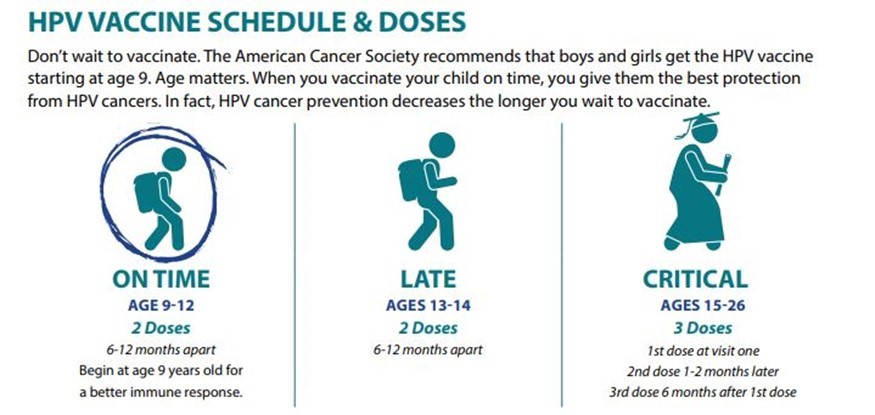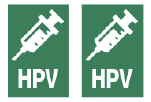About HPV Vaccines
Protect your child from certain cancers later in life with HPV vaccine at age 9–12 years.
Every year, about 36,000 men and women develop a cancer caused by HPV. HPV vaccination could prevent more than 90% of these cancers from ever developing. All children (girls AND boys) ages 9-12 years old should get the HPV vaccine series to protect against cancers caused by HPV infections.
Early protection works best. That’s why the HPV vaccine is recommended earlier (age 9-12 years) rather than later. It protects your child long before they ever have contact with HPV. Also, response to the vaccine has proven to be better at younger ages than older ones. Once someone is infected with HPV, the vaccine might not be as effective or might not work at all. If given before someone is infected, the vaccine can prevent most cases of cancer and anogenital warts caused by HPV.
When should my child get HPV vaccine?
Dose #1
Dose #2
The HPV vaccine is given as a series of shots:
• For kids and teens ages 9–14, the HPV vaccine is given in 2 shots over a 6- to 12-month period.
• People with weakened immune systems (due to chronic illness or on-going treatment), need three doses to be fully protected against HPV.
• Children who start the HPV vaccine series on or after their 15th birthday need three doses, given over 6 months. If you or your teen isn’t vaccinated yet, talk to a health care provider about doing so as soon as possible.
HPV vaccination provides safe, effective, and long-lasting protection against cancers caused by HPV.

Teens and young adults can be vaccinated too
Everyone through age 26 years should get an HPV vaccine if they were not fully vaccinated already.
HPV vaccination is not recommended for everyone older than age 26 years.
- Some adults ages 27 through 45 years who were not already vaccinated might choose to get an HPV vaccine after speaking with their doctor about their risk for new HPV infections and possible benefits of vaccination for them.
- HPV vaccination of adults provides less benefit, because more people in this age range have already been exposed to HPV.
Key Facts
- Children ages 9–12 years should get two doses of the HPV vaccine, given 6 to 12 months apart.
- Children who start the HPV vaccine series on or after their 15th birthday need three doses, given over 6 months.
- Adolescents who receive two doses less than 5 months apart will require a third dose of the HPV vaccine.
- If your teen isn’t vaccinated yet, talk to a health care provider about doing so as soon as possible.
- Everyone through age 26 years should get the HPV vaccine if they were not fully vaccinated already.
- Three doses of the HPV vaccine are recommended for teens and young adults who start the series at ages 15 through 26 years, and for immunocompromised persons. The recommended three-dose schedule is 0, 1–2, and 6 months.
- Three doses are recommended for immunocompromised persons (including those with HIV infection) aged 9 through 26 years.
- Keep in mind that HPV vaccination prevents new HPV infections but does not treat existing HPV infections or diseases. The HPV vaccine works best when given before any exposure to HPV.
- HPV vaccination is not recommended for everyone older than age 26 years. If you are an adult aged 27 through 45 years who was not already vaccinated, speak to your healthcare provider about your risk for new HPV infections and the possible benefits of HPV vaccination.
- HPV vaccination of adults provides less benefit because more people in this age range have already been exposed to HPV.
- The HPV vaccine is made from one protein from the virus and is not infectious, meaning it cannot cause HPV infection or cancer.
- Talk to your healthcare provider if:
- You are or think you might be pregnant. The HPV vaccine is not recommended for use during pregnancy.
- You have severe allergies, including an allergy to yeast.
Reasons to Get the HPV Vaccine
Last Reviewed: February 8, 2024


 Almost every unvaccinated person who is sexually active will get HPV at some time in their life. About 13 million Americans, including teens, become infected with HPV each year.
Almost every unvaccinated person who is sexually active will get HPV at some time in their life. About 13 million Americans, including teens, become infected with HPV each year. HPV infections, genital warts, and cervical precancers (abnormal cells on the cervix that can lead to cancer) have dropped since the vaccine has been in use in the United States.
HPV infections, genital warts, and cervical precancers (abnormal cells on the cervix that can lead to cancer) have dropped since the vaccine has been in use in the United States. Without an HPV vaccine you are at risk for cancers caused by the human papilloma virus. HPV is estimated to cause nearly
Without an HPV vaccine you are at risk for cancers caused by the human papilloma virus. HPV is estimated to cause nearly  HPV-related cancers can cost hundreds of thousands of dollars to treat and can lead to life-threatening illness, or death. Cancer often takes years, even decades, to develop after a person gets HPV. There is no way to know who will develop cancer or other health problems from HPV. Only cervical cancer can be detected with an early screening test, the other cancers caused by HPV may not be detected until they are more serious. HPV vaccination prevents infections that cause these cancers.
HPV-related cancers can cost hundreds of thousands of dollars to treat and can lead to life-threatening illness, or death. Cancer often takes years, even decades, to develop after a person gets HPV. There is no way to know who will develop cancer or other health problems from HPV. Only cervical cancer can be detected with an early screening test, the other cancers caused by HPV may not be detected until they are more serious. HPV vaccination prevents infections that cause these cancers.
 With more than 135 million doses distributed in the US, HPV Vaccine has a reassuring
With more than 135 million doses distributed in the US, HPV Vaccine has a reassuring